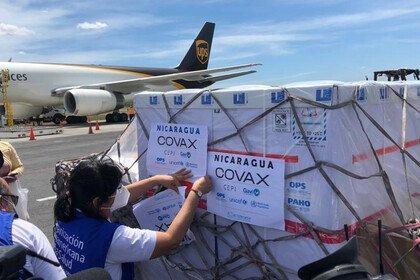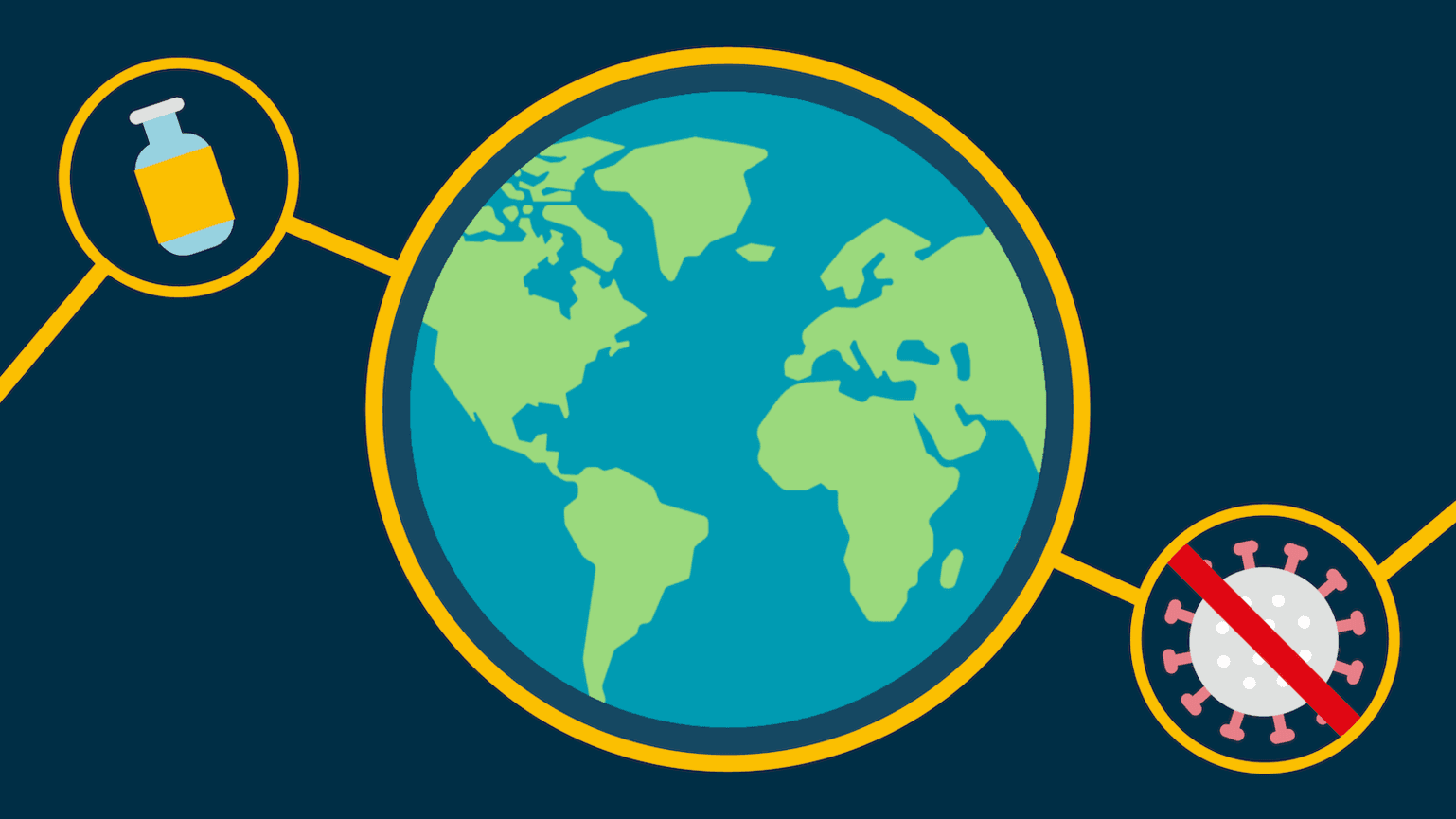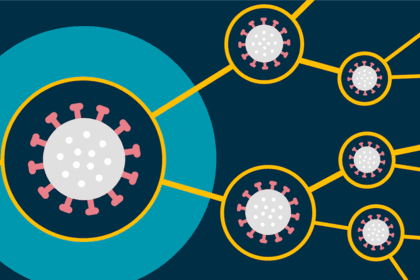
Why we need fair global vaccine allocation to end Covid-19
We know that a global vaccine rollout is essential to get control of Covid-19. Anna Mouser, Policy & Advocacy Lead, Vaccines, spoke to Sir Jeremy Farrar, Director of Wellcome, about why equitable access to Covid-19 vaccines is so important, and what we need governments around the world to do to make it happen.

In 2021 our lives are still dominated by Covid-19. Yet hope for many has been provided through the development of several safe and effective vaccines.
The pace of vaccination in many countries, including the UK, has been staggering. However, the rollout has laid bare the level of global health inequality.
So far, almost 2 billion vaccine doses have been given across the world – but most of them in countries with the highest incomes. Most countries in Africa, for example, have vaccinated less than 2% of their population.
The imbalance is shocking, not just because of its moral failings, but also because it will impact our ability to end the pandemic. We know that a global vaccine rollout is essential to get control of the virus, so we need to make that case clear.
Who better to explain why global vaccination is so important than our director, Sir Jeremy Farrar. I asked him to explain exactly why equitable vaccine access is so important, and what we need governments around the world to do to make it happen.
Why do we need fair global vaccine allocation to end Covid-19?
Jeremy was unequivocal:
"The only way to bring the pandemic to a close and improve all of our lives is to make the vaccines available to everybody. I would rather vaccinate some people in every country than all people in some countries.
"Vaccinating a lot of people in a small number of countries will not bring the pandemic to a close and in fact it will encourage the development of new variants that may escape those very vaccines."
Jeremy called on national leaders to work together to make this happen:
"Leadership really matters. We would be better to vaccinate the whole world than only vaccinate my country or your country. That's what leadership needs to come out and say, make the case for it, and then make it happen. Then I believe those leaders would be on the right side of history."
Pressing play on the video above will set a third-party cookie. Please read our cookie policy for more information.
Why we need fair global vaccine allocation to end Covid-19
Sir Jeremy Farrar OBE, Director of the Wellcome Trust: The only way to bring the pandemic to a close and improve all of our lives is to make the vaccines available to everybody. So I would rather vaccinate some people in every country rather than vaccinate all people in some countries.
Vaccinating a lot of people in a small number of countries will not bring the pandemic to a close. And in fact it will encourage the development of new variants that may escape those very vaccines.
Governments, they're in very difficult positions. But what I would say to them that it is in their interests that we drive down transmission everywhere. If we don't, we will see new variants, we then go back into this awful pandemic of 2020. I think that is the message to policymakers and politicians the world over.
Leadership really matters. That what leadership needs to come out and say. Make the case for it and then make it happen and then I believe those leaders will be on the right side of history.
So what can we expect to see happen this year? What are the key themes and trends around the Covid-19 vaccine rollout?
"For me, I think there are two really big issues on the horizon. There is growing tension about equitable access to the vaccines. The vaccines we know are in short supply. So equitable access to the vaccines, I think is one decision point in 2021 that we must get right.
"Then the second one is humility. We are facing nature and nature changes. We don’t have complete control of that. Humanity is very powerful but viruses, evolution and nature are more powerful. We must have humility and have the flexibility, the wit and the scientific background to be able to respond to whatever 2021 throws us."
Pressing play on the video above will set a third-party cookie. Please read our cookie policy for more information.
Jeremy Farrar explains the need for equitable access to Covid-19 vaccines, and why it is one decision point that we must get right in 2021.
What lies ahead for Covid-19 vaccines for 2021?
Anna Mouser, Policy and Advocacy Lead, Wellcome: If you look ahead across 2021, what do you think the key themes and trends will be this year?
Sir Jeremy Farrar OBE, Director of Wellcome: Equitable access to the vaccines, I think, is one decision point in 2021 that we must get right. There is growing tension about equitable access to the vaccines. We must make sure we keep going with the science that lies behind that, that we make sure we invest in those second-generation vaccines.
I do start 2021 really optimistic about the progress that was made in 2020 and the willingness of the world to come together, including things like the ACT Accelerator and the World Health Organization to say we will not defeat this pandemic until we defeat it everywhere, and I actually feel very optimistic that that will be the course that humanity chooses.
What needs to happen to see that global rollout become a reality?
Jeremy was optimistic:
"In 2020, the world did come together, coordinated by the World Health Organization. It brought together many of the world’s governments, it brought together many of the world’s philanthropy and it brought together many of the world’s industries and agencies.
"It’s that combination of the world coming together under the auspices of the World Health Organization in order to make fair and equitable access, that brings the pandemic to a close."
Pressing play on the video above will set a third-party cookie. Please read our cookie policy for more information.
Jeremy Farrar discusses why international collaboration is essential if we are to achieve a successful global Covid-19 vaccine rollout.
What needs to happen for us to see a global Covid-19 vaccine rollout?
Anna Mouser, Policy and Advocacy Lead, Wellcome: Practically speaking, what do you think needs to happen to see that global rollout to become a reality?
Sir Jeremy Farrar OBE, Director of Wellcome: In 2020, the world did come together, coordinated through the World Health Organization. It brought together many of the world's governments, it brought together many of the world's philanthropy, and it brought together many of the world's industry and agencies.
It's there in order to make sure that the scientific advances of 2020 are now made available and benefit the whole world in an equitable way which brings the pandemic to an end and allows economies to get growing again. And it is that combination of the world coming together under the auspices of WHO in order to make fair and equitable access that brings the pandemic to a close, that will allow education go back, that will allow economies to regrow, and of course, it will protect people's lives.
Touching on why the Covid-19 virus mutates, Jeremy said:
"Viruses mutate randomly. There is no thinking behind it. It just happens and then those mutations give the virus an advantage. It can more easily go from me to you. It can transmit easier, it can pass to other people. Those viruses will become the dominant strains in a community.
"The best way of preventing that is to reduce the amount of virus in the world. Make the vaccines available globally and prevent those variants happening. It’s much easier to prevent than it is to respond to new variants coming into the population of viruses in the world."
Pressing play on the video above will set a third-party cookie. Please read our cookie policy for more information.
Why does the Covid-19 virus mutate?
Anna Mouser, Policy and Advocacy Lead, Vaccines: I wondered if you would describe for a layperson, a non-scientist, this issue of the virus evolving. How would you explain that to somebody without Biology A-Level or similar?
Sir Jeremy Farrar, OBE, Director of the Wellcome Trust: RNA viruses change a lot. HIV viruses are RNA viruses and influenza viruses are RNA viruses, and they mutate. They mutate randomly, there's no thinking behind it. It just happens. And then those mutations which give the virus an advantage, it can more easily go from me to you. It can transmit easier, it can pass to other people. Those viruses will become the dominant strains in a community. We've seen that in the UK, South Africa as well, where a mutation happened. It gave the virus an advantage. It was easier to transmit from one person to another and it became the dominant strain. What is more worrying is the fact that we now have people that have been infected and we're now starting to vaccinate people. Therefore, the virus that mutates in a way that escapes those vaccines or infections will also give those viruses an advantage and they will become the dominant strains. The best way of preventing that is to reduce the amount of viruses in the world, reduce the chances of mutations happening and reduce the chance of that variant having an advantage or becoming dominant. And the best way of doing that is to reduce transmission, make the vaccines available globally, and prevent those variants from happening. It's much easier to prevent than it is to respond to new variants coming into the population of viruses in the world.
Asked whether there is a case for targeting countries where a new variant emerges with more vaccines, Jeremy replied:
"I would not wish, I think, to target particular parts of the world or particular communities. It’s crucial that we push forward with reducing the amount of virus everywhere.
"There are certain communities, senior people, people with other illnesses that are more vulnerable to getting severe illness and needing hospital, and tragically dying. And it’s very important that we protect those that are at greatest risk of ill health, wherever they are in the world. I think that’s the best way out of the pandemic."
Pressing play on the video above will set a third-party cookie. Please read our cookie policy for more information.
Should we target rollout on new Covid-19 variants.
Anna Mouser, Policy and Advocacy Lead, Vaccines: Is there a case for targeting particular countries where a new variant emerges or where there's a risk of a new variant spreading.
Sir Jeremy Farrar, OBE, Director of the Wellcome Trust: I would not wish, I think, to target particular parts of the world or particular communities. It's crucial that we push forward with reducing the amount of virus everywhere. There are certain communities, senior people, people with other illnesses that are more vulnerable to getting severe illness and needing hospital and tragically dying, and it's very important that we protect those that are at greatest risk of ill health wherever they are in the world.
I would much rather we vaccinated those communities everywhere in the world, the most vulnerable and healthcare workers. Maybe 30%, 40% of every population first rather than 100% of some populations. Because by doing that, we'll reduce the burden on the health systems, we'll protect healthcare workers so that they could look after us when we have malaria or whether we have a heart attack or whether we're in child birth or whatever. We need healthcare workers everywhere and we must protect them as a priority. So I would rather vaccinate some people in every country than all people in some countries. And I think that's the best way out of the pandemic.
This article was originally published in March 2021, and updated in June 2021.


